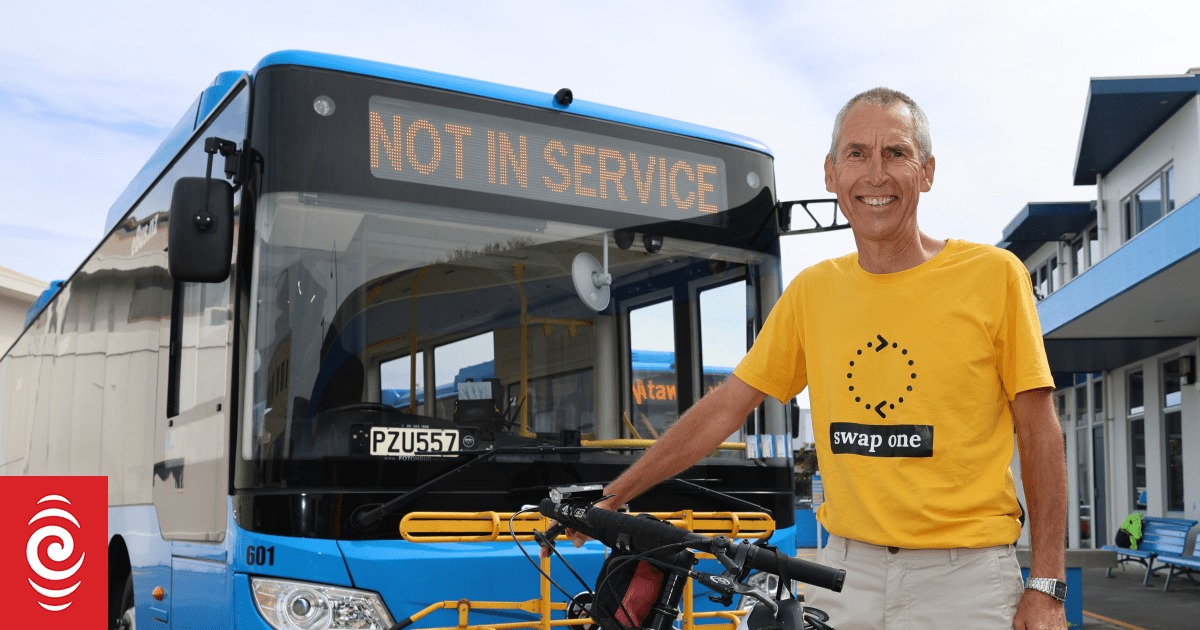Jim Sinner is leading a new initiative, Swap One, that aims to get commuters out of their car one day a week. Photo: Max Frethey / LDR
Nelson has a bold carbon emission reduction target and residents are being encouraged to leave the car at home one day a week to help meet it.
A new initiative called Swap One is being led by the Nelson Tasman Climate Forum and aims to see more people taking low-carbon commutes to work.
“The intent is to give people a tangible way that they can make a difference to climate change,” said project lead Jim Sinner.
Photo:
In July, Nelson City Council adopted a new annual carbon emission reduction target of 8.3 per cent.
Sinner said that if every car commuter chose instead to walk, bike, take the bus, carpool, or work from home one day a week, the city would be halfway to achieving its yearly goal.
“Climate change is really the existential threat to the way we live,” he said.
“People can make a difference if they join together with a community effort.”
Swap One’s website provides information on low-carbon options for curious commuters, while several regional employers have also signed on and will be holding “commute clinics” for their staff to go over the details of alternative commuting options.
Participating employers include Health New Zealand Nelson Marlborough, the Nelson City and Tasman District Councils, Port Nelson, the Nelson Marlborough Institute of Technology, and the Cawthron Institute.
Swap One received a $50,000 grant from Nelson City Council, with the Climate Forum, Mission Zero, and Nelsust collaborating on the initiative, and the council providing technical support.
The council’s acting group manager for strategy and communications, Fiona McLeod, said Swap One helps Nelson meet its climate goals and brings other benefits for the city, such as reduced congestion.
The council has found that 75 percent of its transport-related emissions come from commuting staff.
With an internal target of reducing its energy and transport carbon emissions by 4.8 percent each year, McLeod said that Swap One was “a great way” to help the council lower its emissions.
Swap One was also hosting a breakfast on Thursday morning between 7:30 and 9am at 1903 Square (the opposite side of Selwyn Place to the Church Steps), with free granola and coffee for the first 75 people, to educate commuters about the different options, such as how the eBus service worked, or how to get a discounted e-bike.
While some people couldn’t shift to low-carbon option, Sinner said that for many, it was a case of people not knowing how.
“There are barriers, but I think some of them can be overcome if people just look into it a bit more.”
Swap One’s web app that allows people to join the scheme, log their trips, and go in the draw to win prizes was developed by Year 12 Nelson College student Arturo Neale.
Arturo Neale and Max Harrington won the Business Innovation Award at Cawthron’s Scitec prizegiving last week for Swap One’s web app Photo: Supplied/Cawthron
He and fellow student Max Harrington won the Nelson Regional Development Agency/LifeLab-sponsored Business Innovation Award at Cawthron’s Scitec prizegiving last week for the app.
The judges said their presentation showed a great level of quality of process and were very impressed by the app.
Neale said winning the award felt “really rewarding” after putting “hundreds and hundreds of hours of work” into the web app.
He had been looking for a project to complete in the hopes of using it to secure a scholarship, and his mother who volunteers for Mission Zero mentioned Swap One needed an app.
“I thought it was quite a good technology project,” Neale said.
“My generation… the future that we live in is defined by what we do to solve climate change or to help prevent as much of the impact as possible today, right? So, everything we can do to reduce emissions is important.”
He hoped Swap One makes climate action less daunting for people and encourages more people to take action.
A Cawthron spokesperson said it was committed to finding sustainable solutions and had run its own programme encouraging its staff to choose sustainable commuting options.
“For many years we’ve run our own programme encouraging our people to choose sustainable commuting options, so it made total sense for us to get in behind this wider regional initiative. As a science institute and one of the larger employers in the region, it’s our ambition to lead by example and show that small, practical changes can collectively make a big difference.”
Local Democracy Reporting is local body journalism co-funded by RNZ and NZ On Air
Copyright © 2025, Radio New Zealand
A new initiative is offering spot prizes for commuters in the Nelson Tasman district who ditch their petrol or diesel cars one day a week. One of the organisers, Jim Sinner spoke to Ingrid Hipkiss. Audio
New Zealanders’ love affair with their cars has been put under the spotlight by researchers. Audio
The new buses will coincide with the opening of the City Rail Link.
Wellington will soon have articulated buses, with five ordered for Metlink’s Route 2.
KiwiRail acknowledges the work for City Rail Link will be disruptive for many commuters. Audio
for ad-free news and current affairs
Local Democracy Reporting RSS
Follow RNZ News











